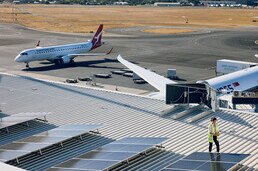
Brisbane Airport Accelerates Net Zero Target by 25 Years
- 2022-08-05
Brisbane Airport passengers will soon begin and end their journey at one of the planet’s most sustainable airports, following the announcement of a dramatic acceleration of emission reduction targets, backed by a plan to get there.
Brisbane Airport Corporation (BAC), today slashed its net zero emissions deadline by 25-years, in a bold move to improve the planet.
"BNE is more than an airport. We are a sustainability leader. We want to create a world-leading Airport City that future generations can be proud of, because of how we acted today, to protect the community of tomorrow," according to Gert-Jan de Graaff, Chief Executive Officer of Brisbane Airport Corporation.
"This is not a new concept for us. We’ve been on this journey for 12 years, but now we are hitting fast-forward to reduce our impact on the planet."
The accelerated 2025 net zero target relates to Scope 1 & 2 activities, which includes emissions from electricity and fuel consumed by BAC.
The journey so far:
2010 285-hectare Biodiversity Zone established, which is more than 10% of the airport’s landmass. 30 European honeybee hives pollinate local flora and produce pure Brisbane Airport Wetlands Honey
2014 Australia’s first Green Star Communities rating
2016 Achieved (and have maintained) Airport Carbon Accreditation (ACA) Level 3: Optimisation.
2018 Launch of Queensland’s 1st, and Australia’s largest, electric bus fleet, reducing emissions by 250 tonnes each year
2019 Installation of over 18,000 solar panels with 6MW generating capacity
NOW Net zero by 2025 for Scope 1 & 2 emissions at BNE and the release of our new Sustainability Strategy
To achieve net zero (scope 1 and 2) by 2025, BAC has committed to transition to 100% renewable energy, purchase all-electric fleet vehicles and develop an onsite carbon removal project within its Biodiversity Zone. Brisbane Airport has allocated 285-hectares to preserve and maintain biodiversity on site, and to act as an improved carbon removal asset.
By 2030, BAC is also committed to 50% use of recycled water, and zero waste to landfill.
Cleaner flying
BAC acknowledges that its responsibilities extend beyond its own operations. BNE is a signatory to the global Clean Skies for Tomorrow initiative. As such, BAC has committed to working with more than 100 other airports, airlines, fuel suppliers and industry stakeholders to put the global aviation sector on the path to net zero emissions by accelerating the supply and use of sustainable aviation fuel (SAF) to 10% by 2030.
Recently BAC also became a signatory for the Mission Possible Partnership (MPP) Aviation Transition Strategy. The aviation sector through this MPP is activating an alliance of global partners to supercharge the decarbonisation of the industry.
"We want passengers to know that when they’re travelling through Brisbane Airport, we are doing everything possible to ensure they are having the lightest touch on planet earth possible. As we plan for the future, our decisions are based on protecting the environment, growing responsibly, and supporting our communities," according to BAC CEO Gert-Jan de Graaff.
"We know we are on a green and gold runway to the 2032 Brisbane Olympic and Paralympic Games. Without the green, there is no gold."







